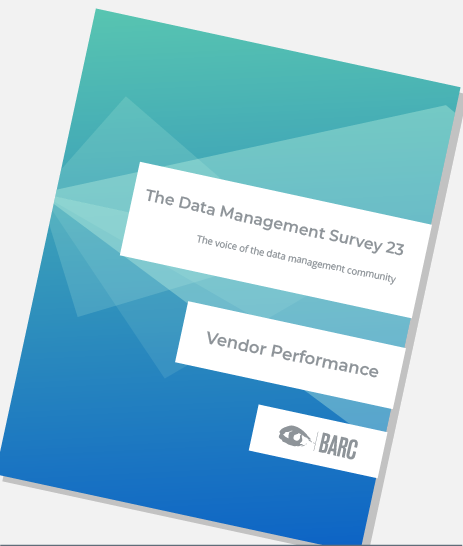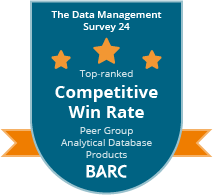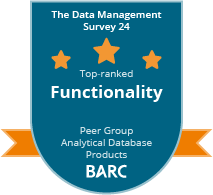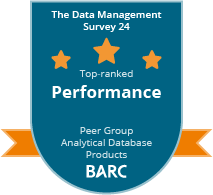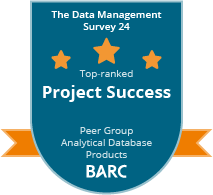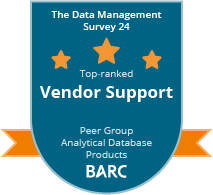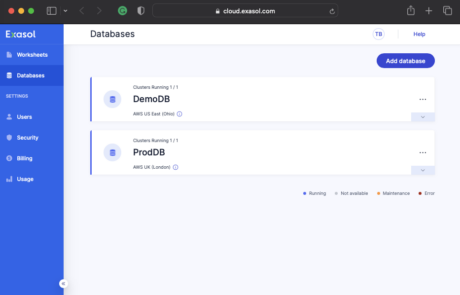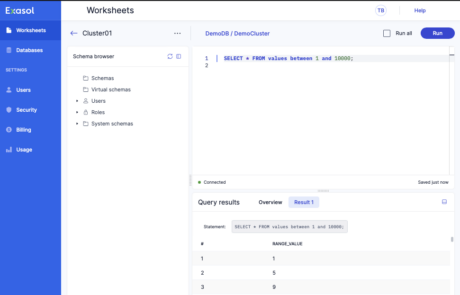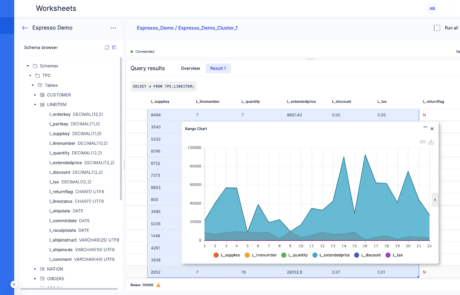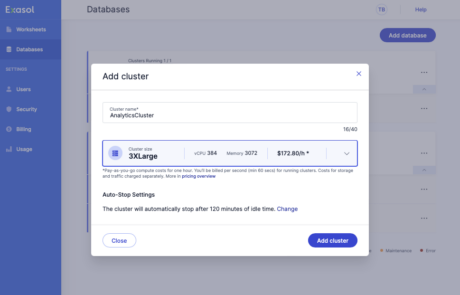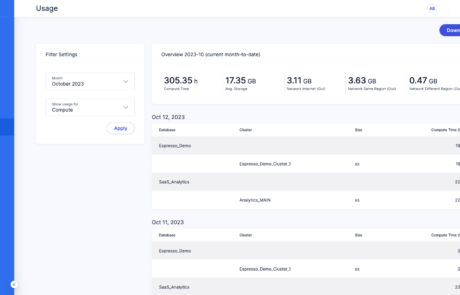
Exasol is a technology provider headquartered in Nuremberg, Germany. Founded in 2000, the company operates mainly in Europe and the United States with the majority of customers coming from German-speaking countries. Sustainably accelerating growth in the United States plays an important role in Exasol’s ambitions. Global companies including T-Mobile, Dell and Verizon rely on Exasol’s software to tackle the challenges of slow query times, fast data growth and the rising operational costs of data environments. Organizations of various sizes and industries use Exasol, which has a broad network of implementation and technology partners. The vendor works with BI implementation partners, systems integrators, resellers and OEMs. Likewise, it is expanding its relationships with strategic partners including MicroStrategy, AWS, Microsoft Azure and Google Cloud Platform. Exasol works closely with its community, which develops the integration capabilities of the database based on a free open source version of the Exasol database on GitHub.
Exasol is a database designed for high-performance analytics (reporting, advanced analytics and ML, real-time KPIs and dashboards). It can be deployed as a BI acceleration layer, data warehouse, or as a data mart. From a technical perspective, it is a relational, column-based, MPP-enabled, in-memory database. It can be deployed as an analytical database in the customer’s cloud account, as a SaaS offering or on-premises.
Exasol sees itself as the highest-performing database for analytical workloads and proves this with TPCH benchmarks. It offers 3 optimization levels, and can be used as an accelerator for BI or analytics, as a logical data platform with a central access layer and as a modernized enterprise data warehouse. In addition, it provides built-in machine learning capabilities where models run directly in the database in any language, thus enabling BI users to access deeper insights through Exasol’s data science integration.
Version 8 introduces a fundamentally renewed architecture. The separation of storage and compute combined with the introduction of multi-cluster support enables completely new operating modes. This architecture is also the basis of Exasol’s SaaS offering. Nowadays, Exasol can be deployed on-premises, with any of the major vendors in the public cloud, in a private Exasol cloud or in a hybrid approach. Its SaaS offering is available on AWS having been developed as part of the AWS SaaS Factory. With this new availability as SaaS, Exasol has also made the transition to a cloud-first company. This means that new functionality is always made available on SaaS first and later released in the other versions (e.g., the self-hosted/PaaS versions of Exasol for public clouds or on-premises).
The database itself is characterized by its high query performance, self-optimization algorithms and a plug-in concept that simplifies the integration and functional expansion of the database.
Self-optimization has been a feature since day one and is constantly being developed. To ensure high performance for current workloads, algorithms monitor database usage as well as keeping the organization of data optimized. This automation is a core function and value-add, but it also means that few manual configuration options are available for the database.
Exasol’s plugin concept enables easy functional extensions of the platform. It mainly includes the virtual connection of new data sources via Virtual Schemas and a framework for the development of in-database analytics programs via R, Python, Java or Lua, that can be executed in parallel.
A good deal of investment has been put into Virtual Schemas. Exasol has developed additional connectors – in particular, for AWS, Microsoft Azure and Google GCP – and expanded support for cloud data formats. Plenty of connectors are available as open source projects in Exasol’s GitHub repository, so customers can easily adapt connectors and also share changes and improvements with the Exasol community.
All our respondents were using version 7 of the Exasol database at the time of the survey. 57 percent were using Exasol as an on-premises deployment and only 10 percent as a SaaS. However, in version 8 (the current version), several further integrations have been added. In particular, integrations with the major public cloud platforms now make Exasol a first-class citizen on these platforms.
Exasol continues to enhance its offering to provide increased productivity, cost-savings and flexibility so businesses can act on real-time insights to drive competitive advantage. This includes advancing scalability across all platforms including SaaS. Improving processing efficiency and lowering the costs of AI/ML so data teams can prepare data for AI-related tasks at speed and at scale on larger datasets while working within budgets and existing tech environments. Exasol is also prioritizing its BI acceleration capabilities, thereby enabling more customers to benefit from faster, deeper and cost-efficient insights without the need for the wholesale ‘rip and replace’ of legacy data environments.

User & Use Cases
81 percent of survey respondents use Exasol for data warehousing and BI, while only 24 percent use it for advanced analytics. This is a clear statement about the preferred use case of Exasol customers. It is also interesting to note that only 38 percent use it for self-service analytics. With the availability of analytical functions as a service paired with the consumption-based licensing model, Exasol could get closer to data users and self-service analytics usage may well strengthen noticeably in the next survey.
76 percent use the database for data integration and a further 48 percent for data preparation. Exasol itself does not have functions for augmented data integration, but it does offer integrations with market leading data integration and data warehouse automation tools. However, the database technology is used to provide integrated views of data and the vendor provides some data warehouse automation capabilities, but these are used by only 24 percent of the customers surveyed.
Exasol is mainly used by large companies with more than 2,500 employees in scenarios with a mean average of 578 users. 71 percent of these companies use the database several times a day. A direct comparison also shows that, on average, significantly fewer administrators are needed to operate the Exasol database and fewer experts are needed to set up the applications. Its automation capabilities and expert support seem to pay off.
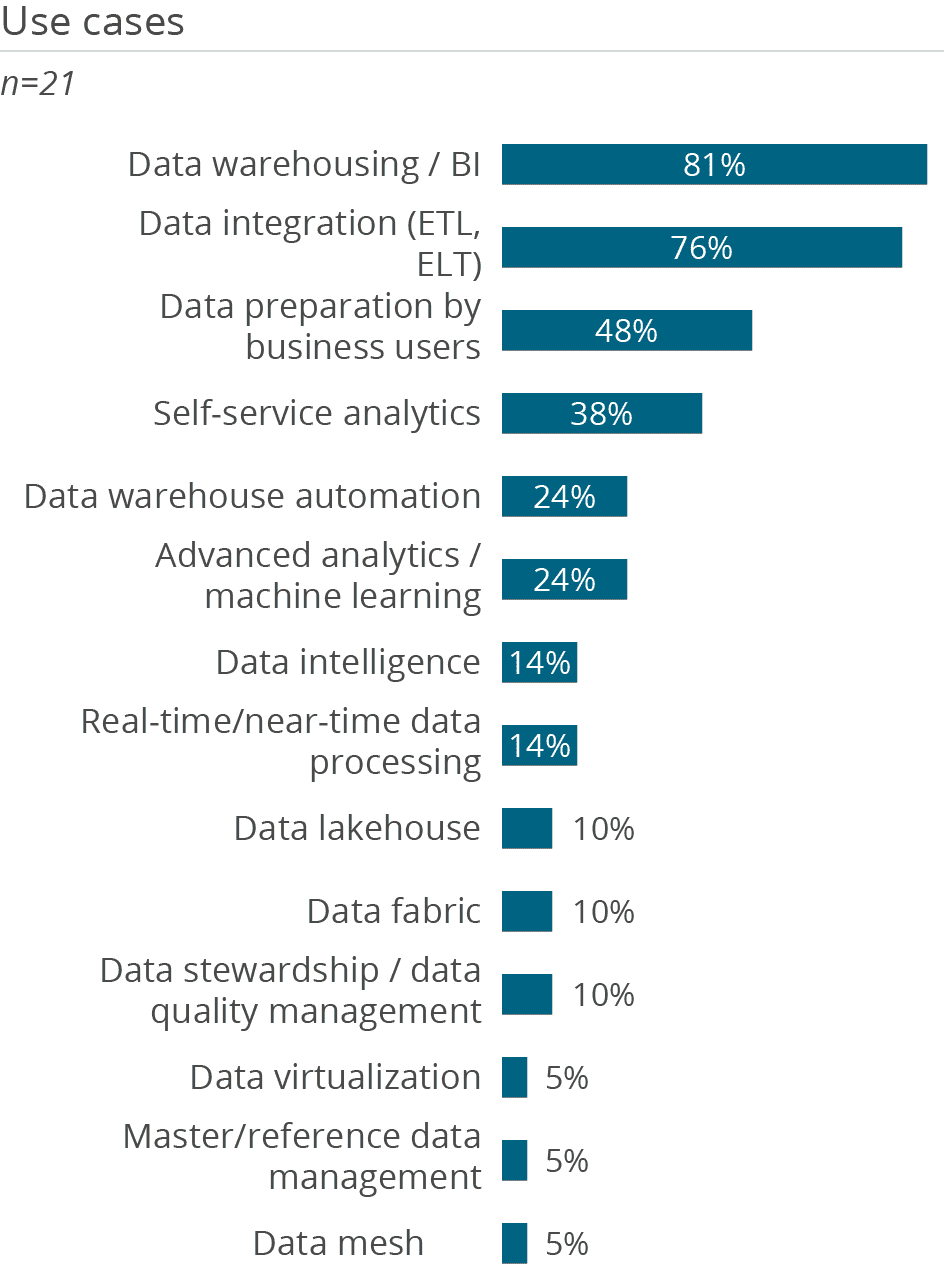

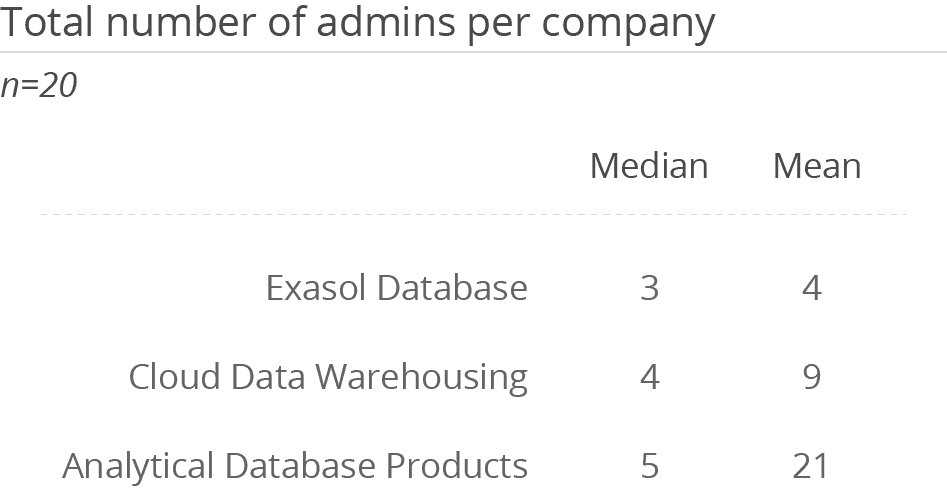
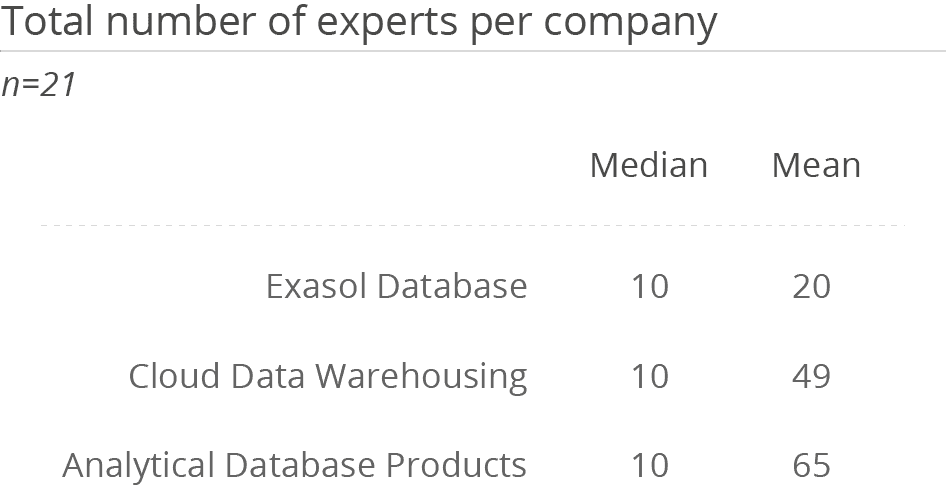
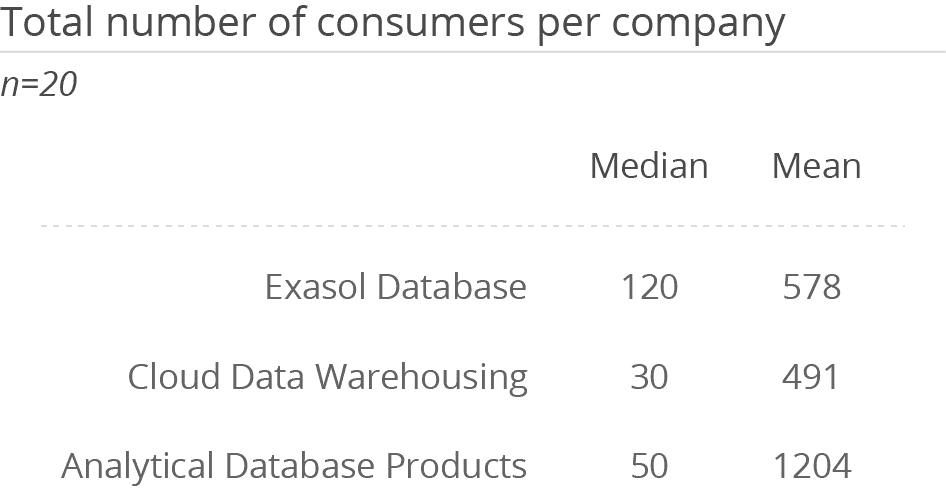

Summary of Exasol Database highlights
User ratings of the Exasol database are well above average in most KPIs this year. ‘Product functionality and performance’ is a prominent technical reason why customers buy the product. 48 percent of companies reported no significant problems with Exasol, a figure that significantly exceeds the average in the Analytical Database Products and Cloud Data Warehousing peer groups. 10 percent of users complained about missing key functionality and reported problems with the connectors.
All in all, Exasol is a really strong performer in this year’s Data Management Survey, achieving 20 top ranks and 13 leading positions in the Analytical Database Products and Cloud Data Warehousing peer groups. When companies evaluate Exasol, its high score in the Competitive Win Rate KPI demonstrates customer satisfaction with its database technology.
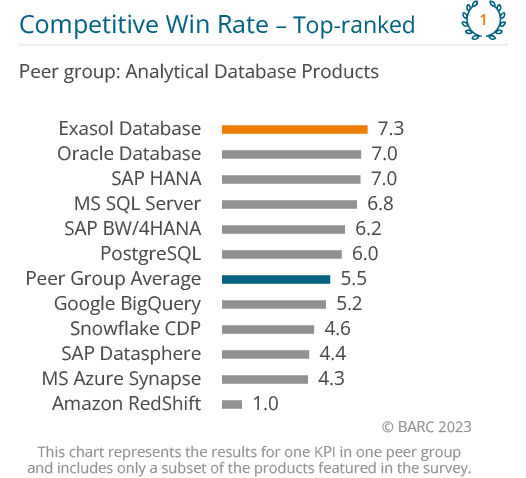
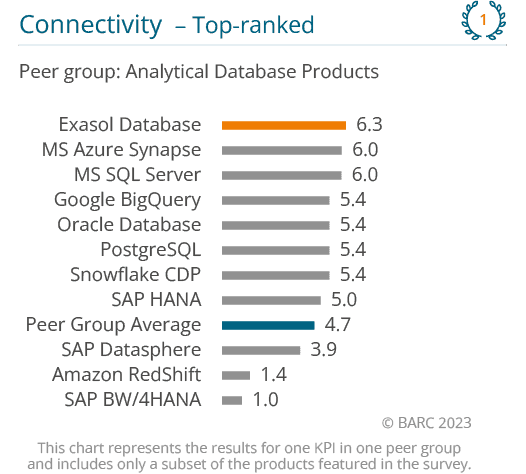
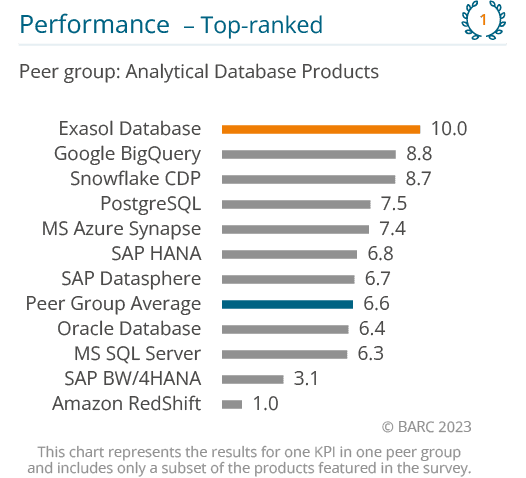
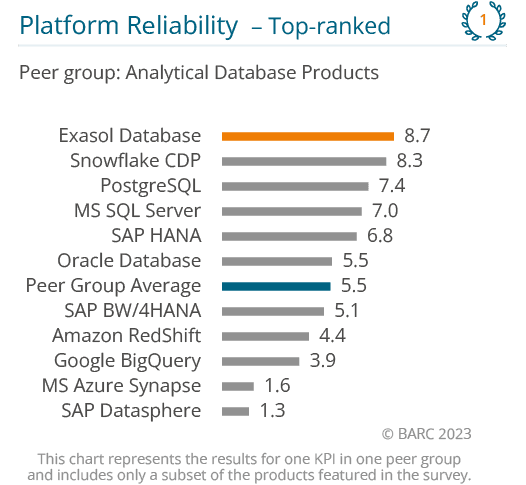
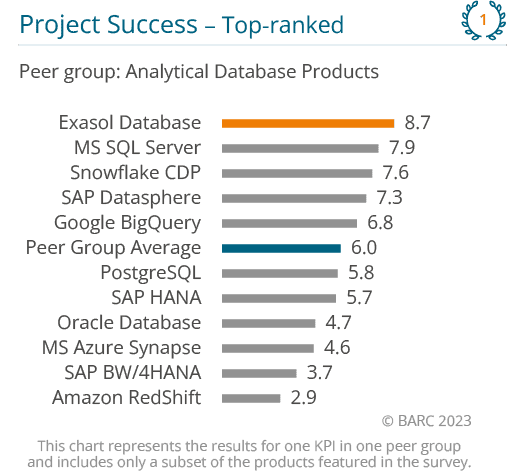
Want to see the whole picture?
BARC’s Vendor Performance Summary contains an overview of The Data Management Survey results based on feedback from Exasol Database users, accompanied by expert analyst commentary.
Contact us to purchase the Vendor Performance Summary- Register for a free sample Vendor Performance Summary download
- If you have any questions, feel free to contact us
